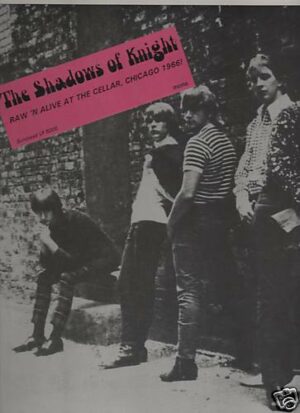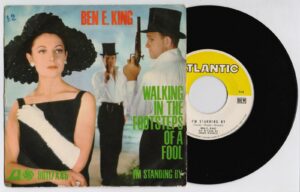Descrizione
PREMESSA: LA SUPERIORITA’ DELLA MUSICA SU VINILE E’ ANCOR OGGI SANCITA, NOTORIA ED EVIDENTE. NON TANTO DA UN PUNTO DI VISTA DI RESA, QUALITA’ E PULIZIA DEL SUONO, TANTOMENO DA QUELLO DEL RIMPIANTO RETROSPETTIVO E NOSTALGICO , MA SOPRATTUTTO DA QUELLO PIU’ PALPABILE ED INOPPUGNABILE DELL’ ESSENZA, DELL’ ANIMA E DELLA SUBLIMAZIONE CREATIVA. IL DISCO IN VINILE HA PULSAZIONE ARTISTICA, PASSIONE ARMONICA E SPLENDORE GRAFICO , E’ PIACEVOLE DA OSSERVARE E DA TENERE IN MANO, RISPLENDE, PROFUMA E VIBRA DI VITA, DI EMOZIONE E DI SENSIBILITA’. E’ TUTTO QUELLO CHE NON E’ E NON POTRA’ MAI ESSERE IL CD, CHE AL CONTRARIO E’ SOLO UN OGGETTO MERAMENTE COMMERCIALE, POVERO, ARIDO, CINICO, STERILE ED ORWELLIANO, UNA DEGENERAZIONE INDUSTRIALE SCHIZOFRENICA E NECROFILA, LA DESOLANTE SOLUZIONE FINALE DELL’ AVIDITA’ DEL MERCATO E DELL’ ARROGANZA DEI DISCOGRAFICI .
TERRY RILEY 1935
OTTIME CONDIZIONI, vinyl ex+ , cover NM
A Rainbow in Curved Air è un album in studio del compositore statunitense Terry Riley, pubblicato nel 1969.
Oltre ad essere considerato uno degli album migliori e più noti del compositore, questa incisione contribuì ad aumentare la sua popolarità al pubblico della musica rock. Il disco è composto da due suite che seguono molte delle idee già presenti nel precedente In C (1969), quali le variazioni di un pattern che cambia lentamente. Tuttavia, a differenza di quell’altra opera che faceva affidamento su un’orchestra, gli strumenti presenti su A Rainbow in Curved Air sono stati tutti suonati dal solo Riley. La solare title track, ispirata alla musica classica indiana e accompagnata dai suoni di un dumbeck, ripete costantemente un motivo melodico di quattordici note riprodotte da diverse tastiere. La seconda suite Poppy Nogood And The Phantom Band, che è arrangiata con un sassofono, presenta invece modulazioni armoniche e sonore un tantino meno dinamiche ma altrettanto geniali e sorprendenti.
Terry Riley (Colfax, 24 giugno 1935) è un musicista e compositore statunitense.
Noto per essere stato tra i fondatori del movimento minimalista, il suo brano In C composto nel 1964 è considerato da molti il primo lavoro del minimalismo musicale americano, corrente artistica cui aderirono compositori come Steve Reich, Philip Glass, John Adams e gruppi rock come The Who, Tangerine Dream e altri. Il titolo della canzone Baba O’Riley di The Who fa proprio riferimento a questo autore moderno.
Etichetta: CBS
Catalogo: S 34-61 180
Data di pubblicazione: 1970
Matrici: CBS S 61180 LPL 2670 1Y 380 / CBS S 61180 LPL 2670 2Y 380
- Tipo audio: stereomono
- Dimensioni: 30 cm.
- Facciate: 2
- Textured sleeve / copertina in cartoncino esterno simil-telato, red label with Biem logo, white paper inner sleeve
Track listing
Face 1
- A Rainbow in Curved Air – 18:40
Face 2
- Poppy Nogood And The Phantom Band – 21:40
- Cover Art – Guy Joly
- Liner Notes – Denys Lemery
Terrence Mitchell Riley, (born June 24, 1935) is an American composer intrinsically associated with the minimalist school of Western classical music and was a pioneer of the movement. His work has been deeply influenced by both jazz and Indian classical music.
Born in Colfax, California, Riley studied at Shasta College, San Francisco State University, and the San Francisco Conservatory before earning an MA in composition at the University of California, Berkeley, studying with Seymour Shifrin and Robert Erickson. He was involved in the experimental San Francisco Tape Music Center working with Morton Subotnick, Steve Reich, Pauline Oliveros, and Ramon Sender. His most influential teacher, however, was Pandit Pran Nath (1918–1996), a master of Indian classical voice, who also taught La Monte Young and Marian Zazeela. Riley made numerous trips to India over the course of their association to study and to accompany him on tabla, tambura,
and voice. Throughout the 1960s he traveled frequently around Europe as
well, taking in musical influences and supporting himself by playing in
piano bars, until he joined the Mills College faculty in 1971 to teach Indian classical music. Riley was awarded an Honorary Doctorate Degree in Music at Chapman University in 2007.
Riley also cites John Cage and “the really great chamber music groups of John Coltrane and Miles Davis, Charles Mingus, Bill Evans, and Gil Evans” as influences on his work, demonstrating how he pulled together strands of Eastern music, the Western avant-garde, and jazz.
Also during the 1960s were the famous “All-Night Concerts”, during
which Riley performed mostly improvised music from evening until
sunrise, using an old organ harmonium (“with a vacuum cleaner motor
blower blowing into the ballasts”) and tape-delayed saxophone. When he
finally wanted a break, after hours of playing, he played back looped
saxophone fragments recorded throughout the evening. For several years
he continued to put on these concerts, to which people came with
sleeping bags, hammocks, and their whole families.
Riley began his long-lasting association with the Kronos Quartet when he met founder David Harrington while at Mills. Over the course of his career, Riley composed 13 string quartets for the ensemble, in addition to other works. He wrote his first orchestral piece, Jade Palace,
in 1991, and has continued to pursue that avenue, with several
commissioned orchestral compositions following. Riley is also currently
performing and teaching both as an Indian raga vocalist and as a solo pianist.
He has a son named Gyan Riley, who is a guitarist. Riley still performs live. He has been chosen by Animal Collective to perform at the All Tomorrow’s Parties festival that they will curate in May 2011.
Techniques
While his early endeavors were influenced by Stockhausen, Riley changed direction after first encountering La Monte Young, in whose Theater of Eternal Music
he later performed in 1965-66. The String Quartet (1960) was Riley’s
first work in this new style; it was followed shortly after by a string
trio, in which he first employed the repetitive short phrases for which
he and minimalism are now known.
His music is usually based on improvising through a series of modal figures of different lengths, such as in In C (1964)and the Keyboard Studies. The first performance of In C was given by Steve Reich, Jon Gibson, Pauline Oliveros, and Morton Subotnick.
Its form was an innovation: The piece consists of 53 separate modules
of roughly one measure apiece, each containing a different musical
pattern but each, as the title implies, in the key of C. One performer
beats a steady pulse of Cs on the piano to keep tempo. The
others, in any number and on any instrument, perform these musical
modules following a few loose guidelines, with the different musical
modules interlocking in various ways as time goes on. To some extent,
though, critics have focused too obsessively on In C, thereby ignoring the full range of Riley’s work and innovations. The Keyboard Studies are similarly structured, a single-performer version of the same concept.
In the 1950s he was already working with tape loops,
a technology then in its infancy, and he has continued manipulating
tapes to musical effect, both in the studio and in live performance,
throughout his career. An early tape loop piece titled The Gift (1963) featured the trumpet playing of Chet Baker. Riley has composed in just intonation as well as microtonal pieces.
Riley’s collaborators have included the Rova Saxophone Quartet, Pauline Oliveros, the ARTE Quartett, and, as mentioned, the Kronos Quartet.
Riley’s famous overdubbed electronic album A Rainbow in Curved Air (recorded 1967, released 1969) inspired many later developments in electronic music, including Pete Townshend‘s synthesizer parts on The Who‘s “Won’t Get Fooled Again” and “Baba O’Riley“, the latter named in tribute to Riley as well as to Meher Baba. The recording had a significant impact on the development of ambient music and progressive rock and predated the electronic jazz “fusion” of Miles Davis, Herbie Hancock, and others.
As Rainbow demonstrates, Riley performs on multiple keyboard instruments, but his principal instrument is actually the acoustic piano. Riley’s 1995 Lisbon Concert recording features him in a solo piano format, improvising on his own works. In the liner notes Riley cites Art Tatum, Bud Powell, and Bill Evans
as his piano “heroes,” illustrating the central importance of jazz to
his conceptions, and his playing bears some notable similarities to that
of Keith Jarrett. (The album title invites this comparison.)
Riley’s work and various innovations have influenced many others in various genres, including John Adams, Roberto Carnevale, Brian Eno, Robert Fripp, Philip Glass, Frederic Rzewski, Mixmaster Morris and Tangerine Dream.






